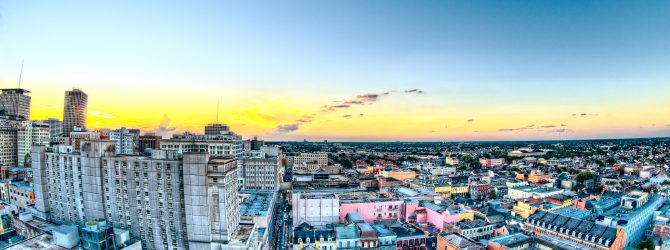At CIPA, students enjoy a host of opportunities to get involved in hands-on experiential learning. One such opportunity is the Student Multidisciplinary Applied Research Team program (SMART), which is led by the Cornell International Institute for Food, Agriculture and Development. The SMART Program brings together teams of students and faculty from different programs and pairs them with firms, organizations, or community groups located in developing countries or developing communities. These hands-on projects challenge students to apply the knowledge and skills learned in the classroom in real world settings. This winter break, CIPA students participating in SMART traveled to research locations in Colombia, Kenya, Louisiana, Rwanda, and South Africa. In this post in our series about SMART projects, we have reflections from Hongdi and Marilyn who traveled to Louisiana to do work on a project to support entrepreneurship.
Supporting entrepreneurship in New Orleans, Louisiana
SMART participants:
 Hongdi Zhao, International Development, 2018
Hongdi Zhao, International Development, 2018
 Marilyn Quaidoo, Economic and Financial Policy, 2018
Marilyn Quaidoo, Economic and Financial Policy, 2018

What was your project?
Our team is working on a program to develop a regional enterprise development strategy for the Foundation of the Mid-south. Under its wealth building priority area, the Foundation is seeking to develop a strategy to strengthen the capacity of small-to-medium businesses by supporting the existing networks/resource systems that support entrepreneurship in the Lower Delta region of the South (Louisiana, Arkansas and Mississippi). Our goal is to provide some recommendations to our client to help the organization strengthen its goal of supporting entrepreneurship in the region.
What was your role in the project?
In December, my teammates and I analyzed the most recent U.S. Census data on small business activities in these three regions to understand the level of entrepreneurship and how it is affecting economic development. We have three objectives in this project:
- Develop a baseline understanding of the level of entrepreneurship in the 3-state region (compared to the US) by compiling the most recent public data sources (US Census, US Department of Commerce, USDA, Arkansas, Louisiana, Mississippi, Hallmark Foundation).
- Conduct a benchmark analysis of university, community, state, and federal organizations that seek to engage entrepreneurs in their respective areas. In this step, we set out to do some “ground-truthing.” We interviewed various stakeholders including entrepreneurs, universities (deans of business and law schools with entrepreneurship hubs), leaders of nonprofit organizations, as well as community, state and federal organizations.
- Evaluate the enterprise development strategies of selected foundations. We are now working on understanding what previous foundations have done in this capacity to develop actionable recommendations to our client, The Foundation of the Mid-South.
What was your favorite part of the trip?

We have five people in the SMART Gulf South team (that’s what we call ourselves). Three of us belong to team A, who traveled to New Orleans this winter. The other two people belong to team B and they will travel to places during the spring break. My favorite part of the trip was the guidance from our team leader (also our professor). He guided us through the whole research procedure and lead us through a debriefing every evening when we were in New Orleans. I really learned a lot from him. I am really appreciative for his patience, honesty, and openness.
What did you learn, or what surprised you?
I would like to put some reflections that we discussed from our team after the project:
- Contextualize your research. One of the most important aspects of our study was situating ourselves with the context of the region to understand some of the economic challenges. Considering the historical background of the Gulf South region was very useful to our conversations.
- Be ready. Each night, our team spent some time to understand the different organizations and leaders that we would interview the next day. From this research, we were able to discuss potential questions and clarify any doubts our clients may have.
- Be specific. This was my first team experience completing data collection through interviews. I have learned the value of asking specific questions relevant to our research while taking notes that would be useful to subsequent conversations.
- Be open-minded. Going to a place different from your current environment entails a lot tolerance. For example, I was surprised at some of the rural areas we visited. It almost seemed like some rural communities in the South could be likened to any rural space in a developing country. One needs to be ready to try new foods, experience new cultures, and meet new people who are totally different from you. Because of our own open-mindedness and the fact that we come from diverse cultural backgrounds, our team was able to embrace the differences that we experienced in Southern US culture from our individual cultures.
- Team work. As they say, “teamwork makes the dream work”. I love the Gulf USA Team! Throughout the week in New Orleans, we learned a lot from each other. We’ve come to understand our strengths and weaknesses to ensure that tasks are delegated appropriately.
- Debrief! Debrief! Debrief! After each session, we went through an hour long debriefing session discussing the key findings and its relevance to our study. These debriefing sessions have been useful to follow-up interviews.
- If you need more information, welcome to go and see our blog: https://smartgulfsouth2017.wordpress.com/

